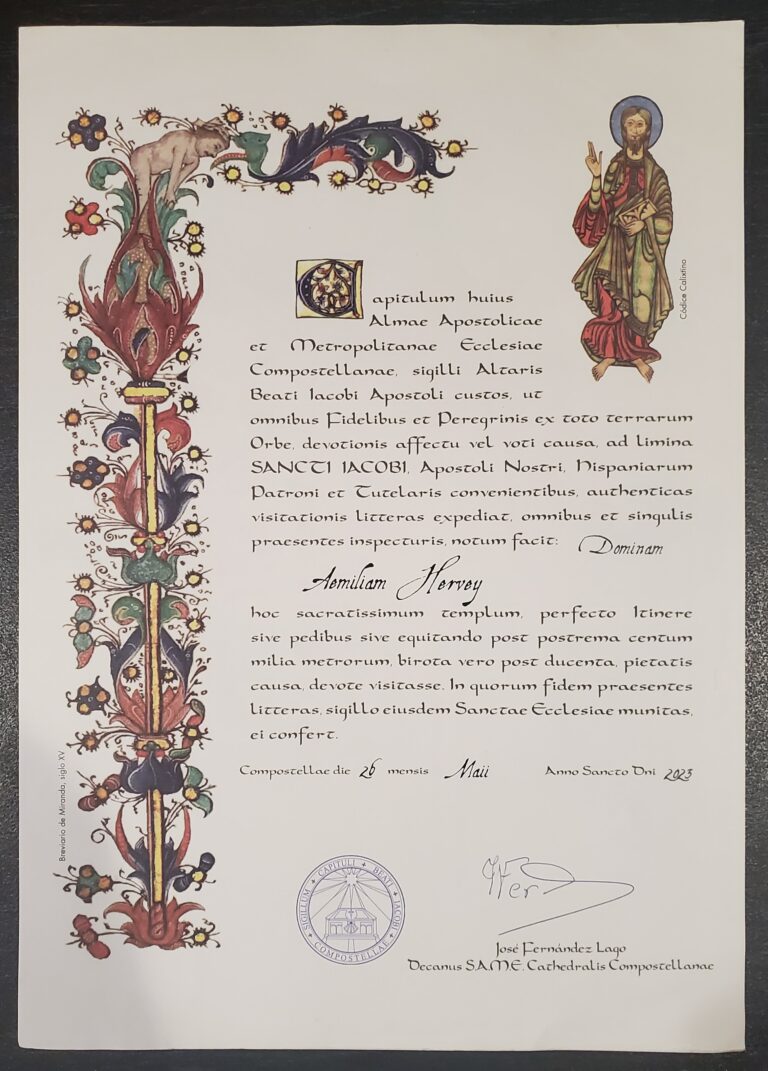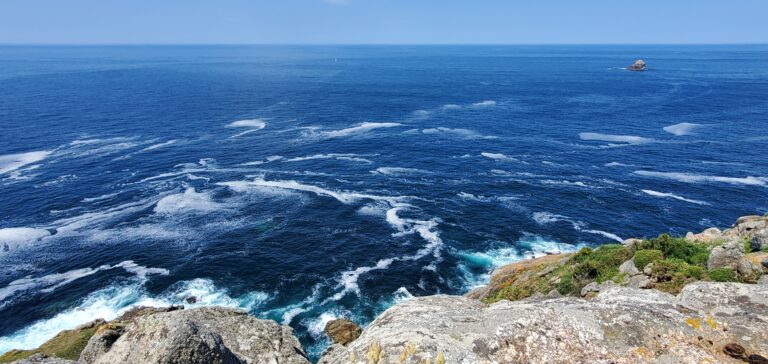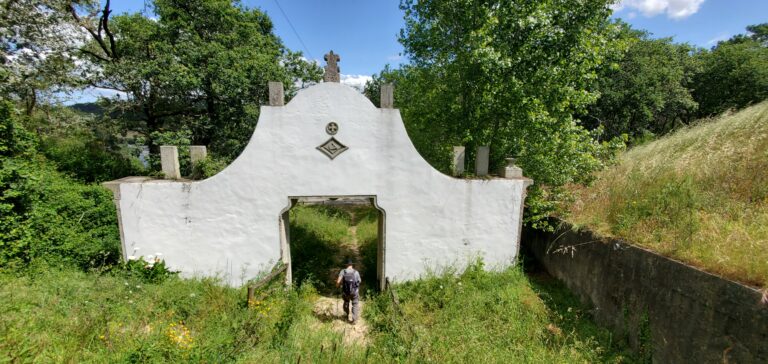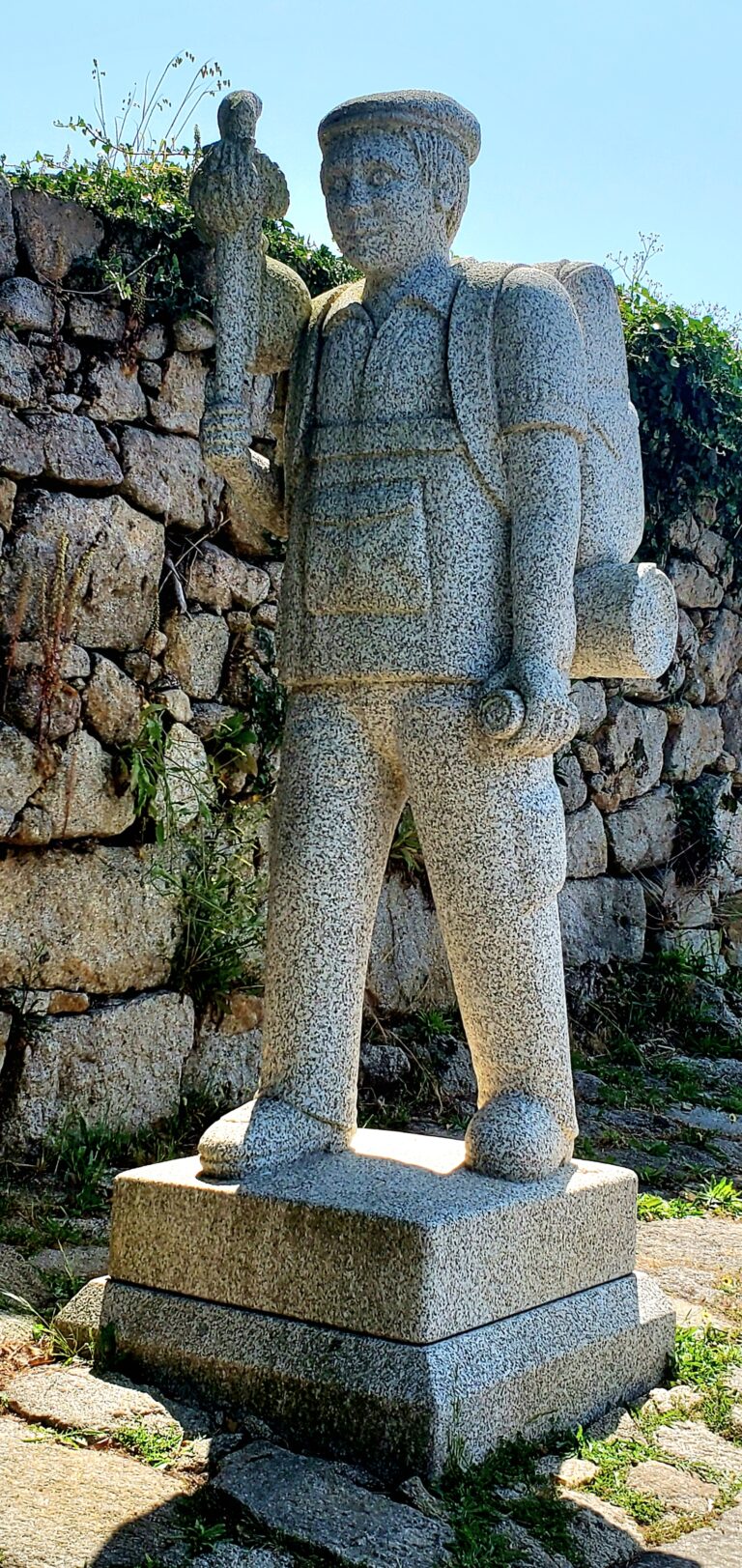Devotional Day 2
Consider it all joy, my brothers and sisters, when you encounter various trials, knowing that the testing of your faith produces endurance. And let endurance have its perfect result, so that you may be perfect and complete, lacking in nothing.
James 1:3-4
Embarking on El Camino

The original expectation was to take a couple days in Porto before launching on our pilgrimage. Out of Dean’s conversation with a fellow pilgrim at the albergue came the idea to walk the first section this morning, going to the cathedral, then down to the river, and following it to the ocean (known as the Littoral Way). (The other pilgrim had walked to Matosinhos, and after a meal and several drinks determined it was time to take the metro back to Porto.)
We still had two nights booked in Porto, but figured we could at least get a head start by walking the first section along the river to the ocean. Others had noted that this was a longer route, but more scenic than some urban and industrial parts of the city.
After wandering toward the center of the city, admiring all the colorful walls and mistaking at least one steeple for belonging to the cathedral, we finally found the official starting point, busy with a mix of tourists and pilgrims, all taking photos. It being at a higher point in the city, we then had to figure out the best route to get down to the river. While surveying the layers of streets and stairs, we came across a young man from Germany doing the same while consulting with his guidebook. Dean struck up a conversation with him, and most of the rest of the day’s walk the two chatted, while I lagged a few steps behind, thinking, praying, and beginning my exploration of the book of James. I started thinking about the word, “joy.”
“Joy“
This passage directly illustrates the difference between happiness, a positive emotion that comes from a natural reaction to positive circumstances, and joy, coming from within the self. Joy is possible even in the midst of trials. It is listed as one of the fruits of the Spirit. Jesus, just before His death, told His disciples that joy would follow sorrow, and no one could take that joy from them. Joy would come and be “made full” when they were in that place of asking and receiving—suggesting a deeper level of attunement of the Holy Spirit, resulting in powerful outcomes (John 16:22-24).
Now James calls believers to consider trials as reasons for joy. This reaction is very different from our natural reaction to trials, whatever they might be. Our human defense system often gets triggered, causing negative physical and emotional responses, and pushing us into whatever coping patterns are already established.
But it can also be in our trials that we run to Jesus, pushing us into a deeper relationship, a deeper communion with Him. That relationship, that intimacy, is the ultimate source of pure joy. A joyful relationship is not the outcome of endurance, but the origin of endurance. Seeking joy may sound dangerous if it means facing trials! But the reality is that trials will always exist. The question is, how do we perceive and react to them? If we see them as opportunities to run to Jesus, that will lead to joy.
Winding Down to the River
Walking in Porto we saw towering churches, outside walls covered in tiles, some offering colorful designs, others displaying entire murals of blue images on white tiles. Beauty merged with tradition, history, and religion, but one might wonder what those decorations meant now. Has the spiritual significance of the Church been lost to many in the crowds gathering for free tours?

After ascending to the cathedral and looking down over the red-tiled roofs and colorful walls along the alleys, we made our way down to the river, Dean talking to his new German friend, while I continued reading and repeating the words of James, contemplating the significance of each phrase.
“…encounter various trials.”
We all face trials, and there’s no need to compare who has had the worst. Instead, we can look at our own story, at our own trials, and ask Jesus where He was in those times of trial. That’s where joy arrives, independent of the circumstances.
As we walked along the coast, hearing the waves crashing and feeling a biting wind on our faces, I thought back to early trials. When living by the Caspian Sea, it was by the cliffs, a thirty-minute walk down the coast, that I escaped the busyness in a family of seven, and yet loneliness in a foreign culture and language. Sitting on the rocks I was alone, no need to worry about anyone else’s expectations, no comparison with my older sisters, no language barriers and accompanying guilt for not learning as quickly or proficiently as some. Comparisons do not bring unity. But my aloneness was also the absence of anyone my age of my nationality or even international culture, anyone who could understand what then felt like trials. At the time I did not recognize the subtle, “hidden” grief.
Seeing Jesus on the Water
I pictured myself by those cliffs, feeling that loneliness as I looked at the sea, asking Jesus where He was. “You were never alone.” There was Jesus, walking on the water. Lord of heaven and earth, not bound by laws of physics, but coming to me. He sat beside me on the rocks. “I felt alone, forsaken on the cross; I know what it feels like. But know that I am always with you; I will never leave nor forsake you.”
In my mind, I leaned into Him, asking if there was anything else He wanted me to know. “Even now I am preparing you for what lies ahead. Depend on Me.” Then He invited me to step out on the water with Him. Could I trust Him? Depend on Him to keep me from sinking in any trials or storms? I was learning to step out.
I am still learning to step out of my comfort zone, into the unknown. All I need to know is Christ’s invitation, all I need to do is respond in faith, one step at a time. Jesus is smiling, taking me by the hand. There is a surge of excitement, standing on the water. This is just a glimpse of His power, and His willingness to include us in His story.
Walking by the Ocean

After a couple hours of walking along the shore, we spot a public toilet, and upon feeling relieved the three of us gave our feet a rest and had a snack for a boost of energy. Walking along the boardwalk there were places to refill our water bottles on a regular basis, a great resource. I joined in their conversation, which had quickly shifted to meaningful topics, from the motivation of walking El Camino, to underlying beliefs and questions. But as the concrete section shifted back to the wooden boardwalk, only comfortably wide enough for two people, I again fell back. Occasionally I stopped to take photos of a church, or the water, or an ancient castle-like guard post.

I read the verse again.
“…the testing of your faith…”
Trials are very effective assessment tools on multiple fronts. In psychology a considerable amount of research has been done on resilience, which is essentially our capacity to “bounce back” from what hardship we encounter. While there are predictive factors (healthy support systems, emotional stability, effective coping strategies, etc.), we don’t actually see resilience until encountering trials. Faith is really a key component of resilience. Our reaction to God in the midst of suffering unveils the nature of our relationship with Him. Are we angry that He has allowed this to happen? Afraid that it is a display of His wrath over our shortcomings? Convinced that His failure to answer our prayers for deliverance is evidence of His lack of power or even existence? Just confused by all the explanations being offered as the reason for this suffering?
While a wide range of emotional reactions to loss and trauma are normal, the underlying belief systems also emerge, revealing our perception of God and our expectations of Him. Our faith is indeed tested, but not only as an assessment. Testing is part of the learning and refining process. It isn’t a pass/fail exam. Instead, it unveils what needs to be confronted, challenged, or re-framed.
When the disciples were being thrown around by a storm and encountered Jesus on the water, their fear was revealed, their lack of recognition that Jesus was all-powerful, or shock when seeing that power over creation displayed. Peter showed a significant level of faith when stepping out of the boat, but the limit of even his faith was measured when he looked around and started to sink. He too had room for growth. Faith is like a muscle: the more it is used, the more it is stretched and stressed, the stronger it will become. God can use trials to stretch our faith, challenging our capacity to depend fully on Him.
Prayer
Thank you, Lord, for the trials we encounter, and for Your Presence alongside us as we walk through those trials. Help me to draw more closely to You, learning to depend on You in faith, and finding joy in You, regardless of the circumstances.
Reflective Response
- What relationships bring you joy? How do those relationships compare with your relationship with God?
- Think of the trials you’ve faced. How have they shaped your faith?
- Who do you know who is facing significant trials right now? Consider ways to show reach out to them, not by minimizing the trial, but by being a vessel of God’s love.
Would you like to be notified about future posts? Subscribe here!






